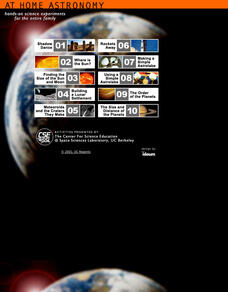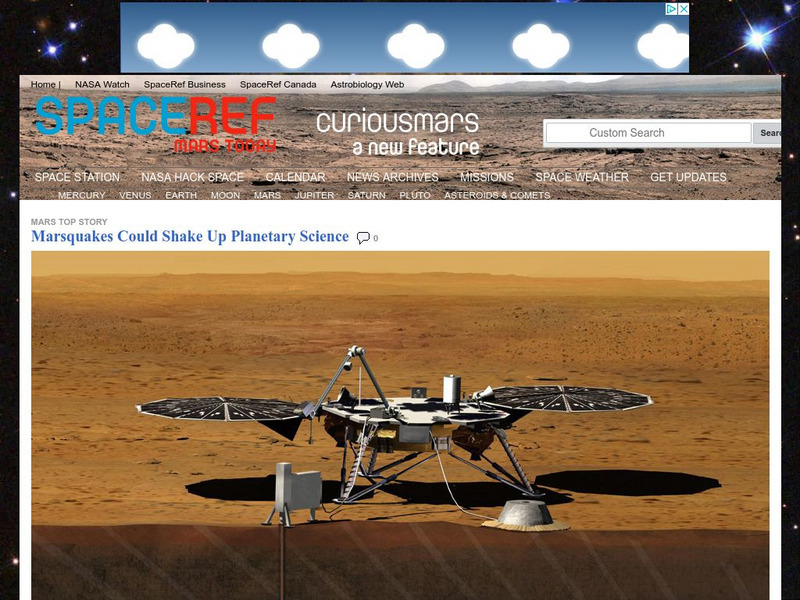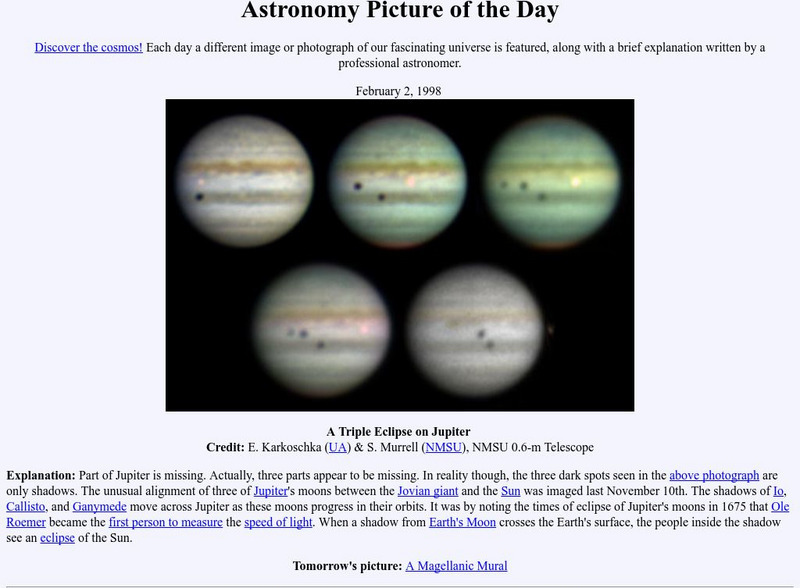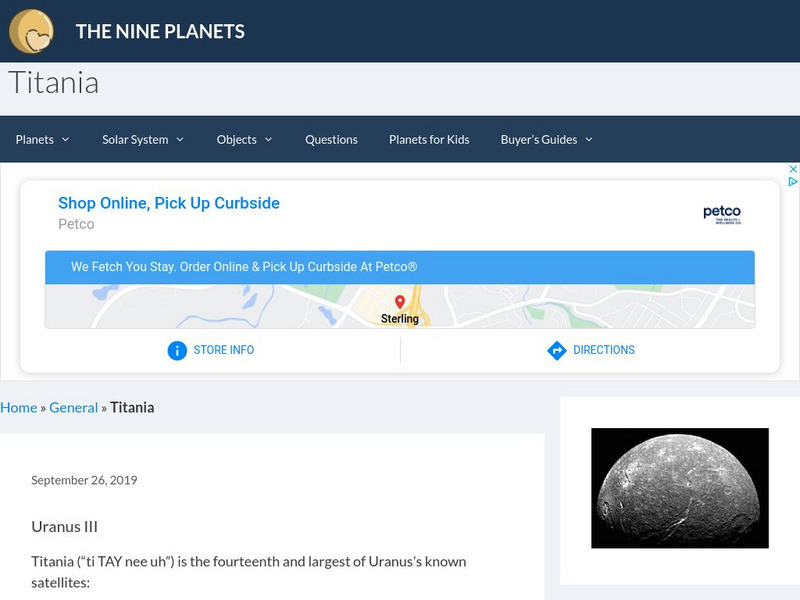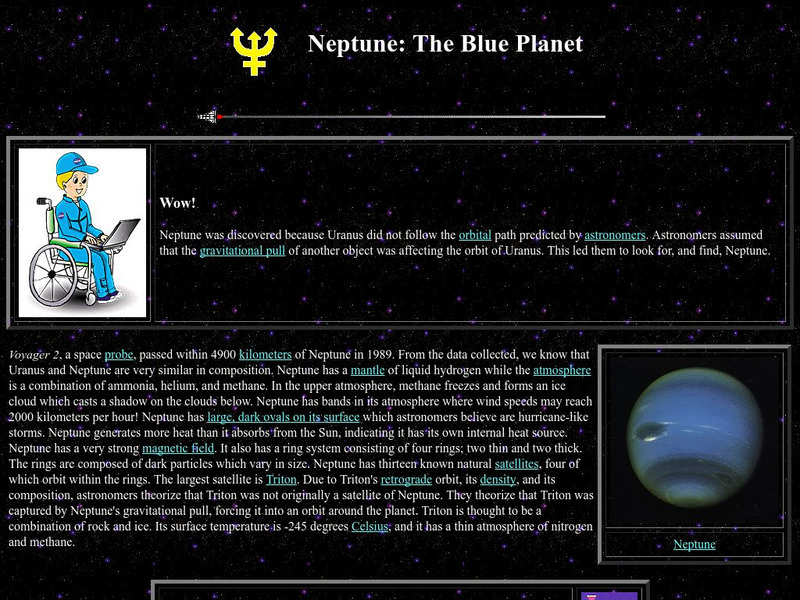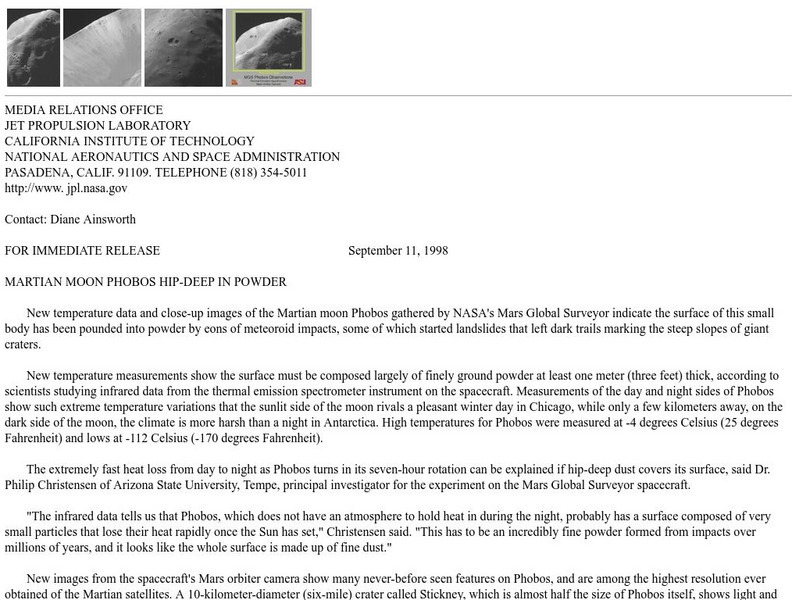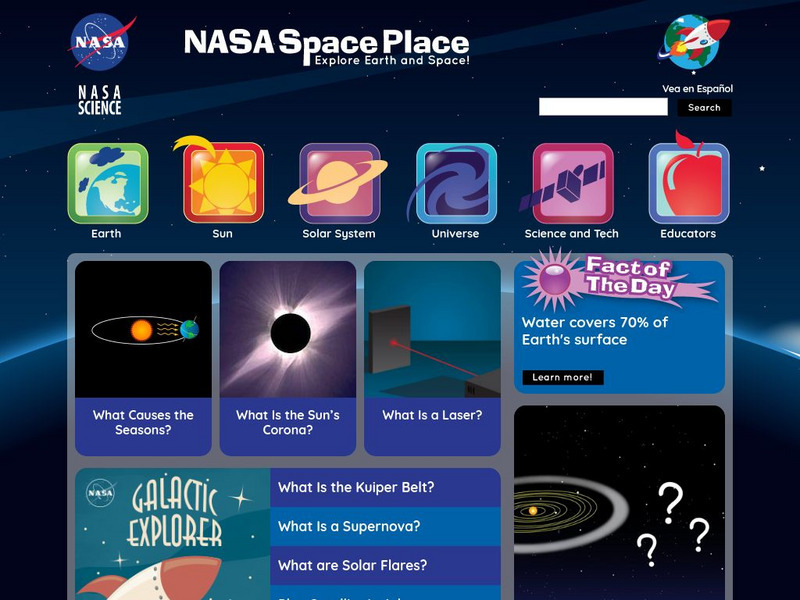University of California
At Home Astronomy: Hands on Science Experiments for the Entire Family
A collection of ten hands-on science experiments for the entire family that will help you understand concepts in astronomy. Make an astrolabe, find the size of the sun and moon, build a lunar settlement, find out about meteoroids, shadow...
Other
Mars today.com: Home Page
MarsToday.com provides a collection of sites related to the planet Mars. Not your dad's "Whole Earth Catalog" since it's missing all of the advertising and humor. Latest news, basic planetary facts, and historic missions to Mars.
Other
Space Research Institute: Phobos Mission
Images of Phobos, taken by the Soviet Phobos mission to Mars, prior to the loss of the spacecraft. Small images do not link to graphic files.
Other
Canal Kids: Ciencias (Science for Portuguese Speakers)
Colorful, engagingly written information about astronomy and biology for Portuguese-speaking English language learners. Both subjects are broken down into a broad array of related subtopics. The biology section is particularly helpful...
NASA
Nasa: Astronomy Picture of the Day: Jupiter
A triple eclipse crossing the face of Jupiter on 2 Feb 98. This set of five images captures the passage of the shadows of Io, Callisto, and Ganymede across the face of Jupiter.
NASA
Nasa: Astronomy Picture of the Day: Uranus's Moon Umbriel
Brief overview of Umbriel from NASA. Answers the question "why is the moon so dark"? Provides additional links for more information. A NASA picture of the day.
NASA
Nasa: Astronomy Picture of the Day: Titania, Uranus's Largest Moon
A brief overview of Titania, Uranus's largest moon. Includes a very good description of the moon's surface. A NASA picture of the day.
E-learning for Kids
E Learning for Kids: Science: Seychelles: What Is the Solar System?
In this lesson, students learn about the planets, their moons, asteroids, comets, and dwarf planets in our solar system.
NASA
Nasa Space Science Data Archive: Photo Gallery: Jupiter
Images of Jupiter and its moons. Thumbnails lead to small JPEG graphic files. Some link to large, high-resolution TIFF files. Nearly all have a detailed caption file link.
NASA
Nasa Space Science Data Archive: Galileo
NASA offers three images taken by the Galileo spacecrart capture the faces of Ganymede and Io. Files, with detailed caption can be downloaded in GIF format.
National Earth Science Teachers Association
Windows to the Universe: Origin of Jupiter's Rings
University of Michigan and Windows to the Universe offers information showing that with the help of the Galileo spacecraft, scientists figured out that the rings are made from dust that was kicked off of the small moons surrounding...
National Earth Science Teachers Association
Windows to the Universe: Jupiter's Moons and Rings
Windows to the Universe of the University of Michigan gives a brief introduction to Jupiter's rings. The information can be accessed in a beginner, intermediate, or an advanced setting.
Nine Planets
The Nine Planets: Titania
A general overview of Uranus's largest moon, Titania. Includes a picture and additional links to other sites for more detailed information, making this a great site to check out on the subject.
NASA
Nasa Star Child: The Blue Planet (Level 2)
A good general introduction to planet Neptune for students. Has many links to more detailed information about the planet throughout the page, as well as special links for interesting facts. Also features a printable version of the page.
NASA
Nasa Science: For Kids: Solar System Fun
Test your knowledge about the solar system with games and activities designed to help explore what you know about the sun, the planets and their moons, space rocks, the Milky Way, and related topics.
NASA
Nasa: Martian Moon Phobos Hip Deep in Powder
This press release from NASA, based on data from the Mars Global Survey/Mars Orbiter Camera describes Mars' moon Phobos. Included are small thumbanil images that link to more detailed GIF files.
NASA
Nasa Space Science Data Archive: Neptunian Satellite Fact Sheet
A pair of small tables of data that contain just about everything known about the moons of Neptune.
Alabama Learning Exchange
Alex: Comets
During this lesson, middle schoolers have the opportunity to explore comets. By navigating the Internet, viewing a slideshow, and participating in a videoconference with NASA, students will discover what comets are all about.
Trinity College Dublin
The History of Mathematics: Roemer
A short biographical sketch of the life and work of Ole Roemer (1652-1719 CE). Identifies his scientific discoveries and contributions in astronomy.
NASA
Nasa: Astronomy Picture of the Day: Uranus's Moon Oberon
Brief overview of Oberon, the most distant and second largest moon of Uranus. Includes its discovery and also a few pictures. A NASA picture of the day.
NASA
Nasa: The Space Place
This site from NASA's Space Place is geared towards early elementary learners. It offers detailed instructions for crafts and activities related to space, games and a teacher resource area. Students can also ask an expert at this site.


